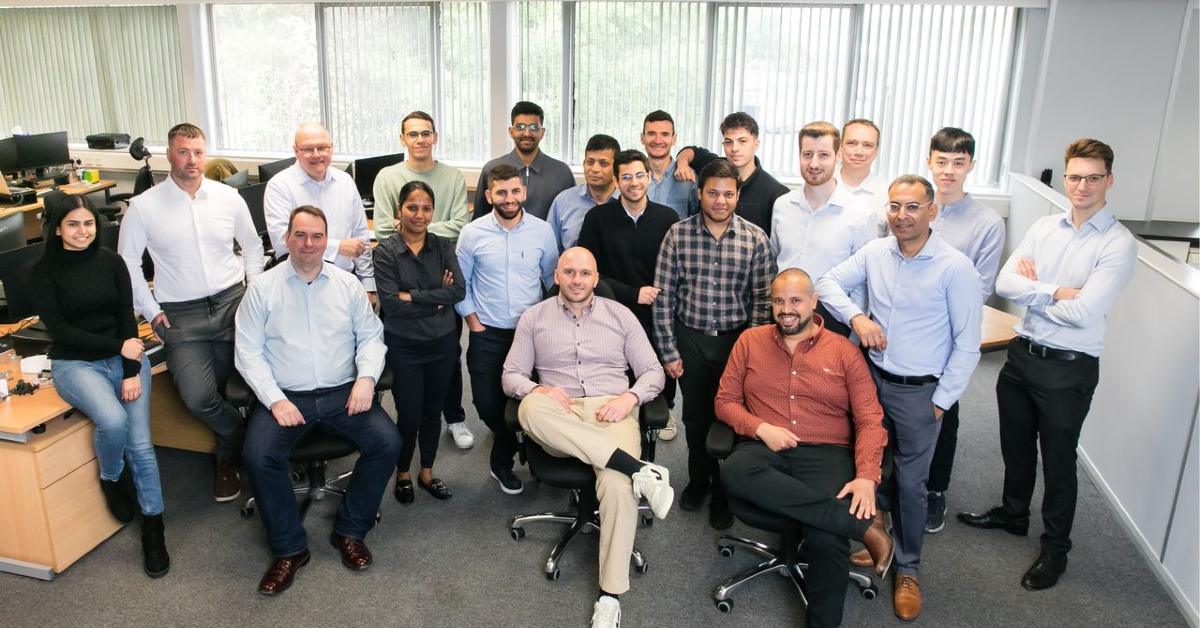For centuries, people have traded across country borders. So when it comes to handling multi-currency payments, you would expect someone to have figured it out by now. Fast-growing fintech company iBanFirst is trying to do just that by helping businesses make and receive international payments simply and safely. Meanwhile, the French-Belgium company itself is also scaling up internationally.
‘Trust is key’
“We take away the three main pains from small and medium enterprises when they do international business”, says David Remaud. He is the CMO at iBanFirst, where his main task is building trust with customers. “We are growing fast and becoming increasingly well-known. But as a fintech, it is equally important to be reliable. We are a payment institution, so trust is key.”
There is no better way to build trust than delivering a product that helps customers. iBanFirst allows businesses to send and receive payments to over 150 countries in more than 30 currencies in just a few clicks. Their product portfolio helps businesses in three distinct ways.
First, they offer transparency in the payment process. For example, entrepreneurs and CFOs can track their international payments to precisely know what stage their payment is in its journey and provide precise updates to their clients. Another way iBanFirst makes international payments easier is by providing ample support: “SMEs don’t usually hold sufficient weight to be given access to a dedicated desk at a bank”, says Remaud. “This is where our support team differentiates us from traditional banks.”
Last but not least, Remaud explains that iBanFirst helps mitigate volatility in the market. With exchange rates fluctuating, making international payments can be a bit of a gamble. “We can secure the margin”, says Remaud. “Our product serves as insurance. When making an international payment, you can lock in your currency exchange rate.”
An idea from experience
iBanFirst was founded in 2013 by Pierre-Antoine Dusoulier, former VP at Saxo Bank. Remaud: “He saw how businesses, and especially SMEs, were not being catered for by banks and how they struggled with international payments. He understood that there was an opportunity to grasp. His entrepreneurial drive came from a desire to solve a problem and address a clear need by drawing on his own professional experience and know-how,” says Remaud. The key to providing that value was offering ample support for entrepreneurs.
That support means entrepreneurs can always contact iBanFirst with any question or issue involving international payments. “Our founder is a former trader. So he understands those things”, says Remaud. The main differentiator that sets iBanFirst apart from other fintech SaaS solutions is that its payment infrastructure comes with a dedicated account manager and access to field experts if needed. Does offering a product with this level of expert input make it harder to scale? For iBanFirst, there is no other way. “There are some things you just can’t cut corners on. And we’ve noticed that if we take good care of our customers, they take good care of us.”
‘Growing, even during COVID’
This dedication reflects in iBanFirst’s rapid growth. “International trading by SMEs has been growing steadily at 10 per cent a year”, says Remaud. “Even during the COVID lockdowns, it was growing.” The volatility in the market seemed to be working in iBanFirst’s favour, and businesses were eager for more transparency and security.
Last year, iBanFirst gained recognition as the fastest-growing fintech company in Belgium by Deloitte. It is one of the 80 fastest-growing companies in Europe. After spending a few years developing its platform, the company took off, and since 2016, it has been growing triple digits every year. The company now employs 250 people and is looking to grow to 400 people by next year.
International expansion
The company started its expansion to international markets by acquiring competitors in The Netherlands and Germany. In 2020, it raised €21 million in a Series C funding round led by Elaia and Bpifrance’s Large Venture fund, bringing the total to €46 million.
The uncertain times that COVID brought also came with new challenges, Remaud recalls. They saw some of their customers not keeping their heads above water. Remaud: “We lost a lot of clients. That was tough.” However, the exploding home delivery industry brought on a new group of clients with different profiles.
“We learnt to innovate and adapt”, says Remaud about bringing on the surge of new clients in a time when meeting at the office was not an option. “The way we contact new people has changed. How do you keep people engaged when you can’t meet? I don’t see it going back to how it was before the pandemic for sales and marketing. We need to find new ways to stay in touch.”
‘Salesforce helps us grow internationally’
Remaud is already actively engaging in these new ways by implementing Salesforce in the marketing and sales operations. “When I arrived at iBanFirst, we didn’t have Salesforce. And as a marketer, I want to look at the data, and that’s where you need a good customer relationship management process: one that follows companies from the very first lead, all the way to the end, while detailing the entire journey in between.”
It is vital for a fintech, whose onboarding process can be particular. Remaud mentions the KYC (Know Your Customer) process as an example: “If you do that process by email, it can be a hassle. But if you build it in your CRM, you always know where you stand. You know exactly where a blockage occurs. For instance, some new clients may abort the process because their ID cards won’t be automatically read. Now we can measure those processes and improve where necessary.”
“It’s an investment”, admits Remaud. “You can get their product out-of-the-box and reconfigure it, or you can implement it yourself. We did the latter. After spending a bit of time setting it up, we can now measure anything we want. The sales department manages thousands of clients a month. Everything is recorded, and it means we’re now sure never to forget a lead or call someone twice. Gathering a comprehensive and detailed overview of each company, including their growth history and how they operate, allows us to work very efficiently. It’s exactly what we need to scale internationally.”
iBanFirst uses Salesforce CRM. Want to find out what CRM can do for your business? Read their handbook that explains how to make a success of your first steps with CRM. You’ll find all the information you need on how to build your CRM strategy, how to maximize your ROI and how to improve your sales and productivity.










01
From telecom veteran to Dutch Startup Visa success: The Jignesh Dave story